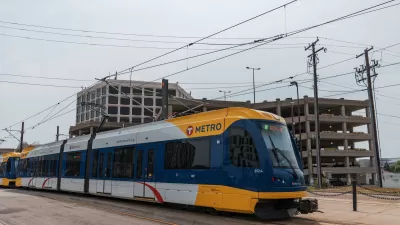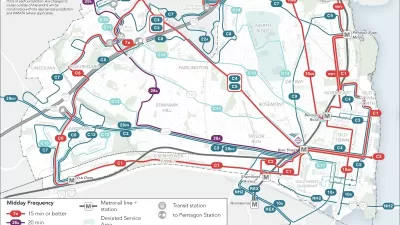A few weeks ago, I was reading yet another think-tank paper arguing against new rail projects. Amidst the sea of technical detail, one assertion bothered me: the common claim that bus service is more “flexible” than rail.
A few weeks ago, I was reading yet another think-tank paper
arguing against new rail projects.
Amidst the sea of technical detail, one assertion bothered me: the
common claim that bus service is more "flexible" than rail.
Indeed it is- and that's precisely what's wrong with
it. Flexibility means unreliability. In particular, flexibility means that politicians can eliminate your bus service whenever
recession or overspending in other areas leads to a fiscal crisis. Bus service is an easy target: it often
serves people too poor to give campaign contributions or become politically
organized, and its environmentalist supporters have dozens of other issues to
worry about. For example, in Denver bus ridership is
rising- yet due to increased fuel costs, service may actually be reduced. (See http://www.9news.com/news/article.aspx?storyid=91837
)
Politicians tend to justify bus cutbacks by stating that
they are merely reducing low-performing service. But as long as there is more than one bus
route in a city, some routes will always have fewer riders than others. So this theory, if consistently applied,
would ultimately lead to the elimination of every route but the most popular
one- hardly a desirable result.
By contrast, recessions and other economic problems tend to
have a relatively modest impact on rail and highway service- perhaps because
the larger up-front costs of rail and highway expansion cannot be recovered by
cutbacks in service, perhaps because affluent, politically influential people
are more willing to drive or ride trains.
Does the reliability of rail service mean transit supporters
and users should support new rail service in every city? Not necessarily; obviously, intracity rail
service is not practical everywhere.
But certainly, this factor is one of many relevant considerations – a
thumb on the scale favoring construction of new subways and light rail systems.
Of course, it is certainly possible to make bus service less
vulnerable to the political winds. For
example, imagine an America in which state or federal civil rights law protected bus
service from cutbacks, on the grounds that cutting bus service without blowing
up the occasional highway or two had a disproportionate impact on racial minorities or adversely affected air quality. In such an America, bus service would be as politically impregnable
as highways or even rail service- and I would certainly be less willing to support
rail service in my city.
But of course, that's not the America I live in.

Manufactured Crisis: Losing the Nation’s Largest Source of Unsubsidized Affordable Housing
Manufactured housing communities have long been an affordable housing option for millions of people living in the U.S., but that affordability is disappearing rapidly. How did we get here?

Americans May Be Stuck — But Why?
Americans are moving a lot less than they once did, and that is a problem. While Yoni Applebaum, in his highly-publicized article Stuck, gets the reasons badly wrong, it's still important to ask: why are we moving so much less than before?

Using Old Oil and Gas Wells for Green Energy Storage
Penn State researchers have found that repurposing abandoned oil and gas wells for geothermal-assisted compressed-air energy storage can boost efficiency, reduce environmental risks, and support clean energy and job transitions.

Updating LA’s Tree Rules Could Bring More Shade to Underserved Neighborhoods
A new USC study finds that relaxing Los Angeles’ outdated tree planting guidelines could significantly expand urban tree canopy and reduce shade disparities in lower-income neighborhoods, though infrastructure investments are also needed.

California's Canal Solar Projects Aim to Conserve Resources and Expand Clean Energy
California’s Project Nexus has begun generating electricity from solar panels installed over irrigation canals, with researchers and state agencies exploring statewide expansion to conserve water and boost clean energy production.

HHS Staff Cuts Gut Energy Assistance Program
The full staff of a federal program that distributes heating and cooling assistance for low-income families was laid off, jeopardizing the program’s operations.
Urban Design for Planners 1: Software Tools
This six-course series explores essential urban design concepts using open source software and equips planners with the tools they need to participate fully in the urban design process.
Planning for Universal Design
Learn the tools for implementing Universal Design in planning regulations.
Heyer Gruel & Associates PA
City of Moreno Valley
Institute for Housing and Urban Development Studies (IHS)
City of Grandview
Harvard GSD Executive Education
Salt Lake City
NYU Wagner Graduate School of Public Service
City of Cambridge, Maryland





























